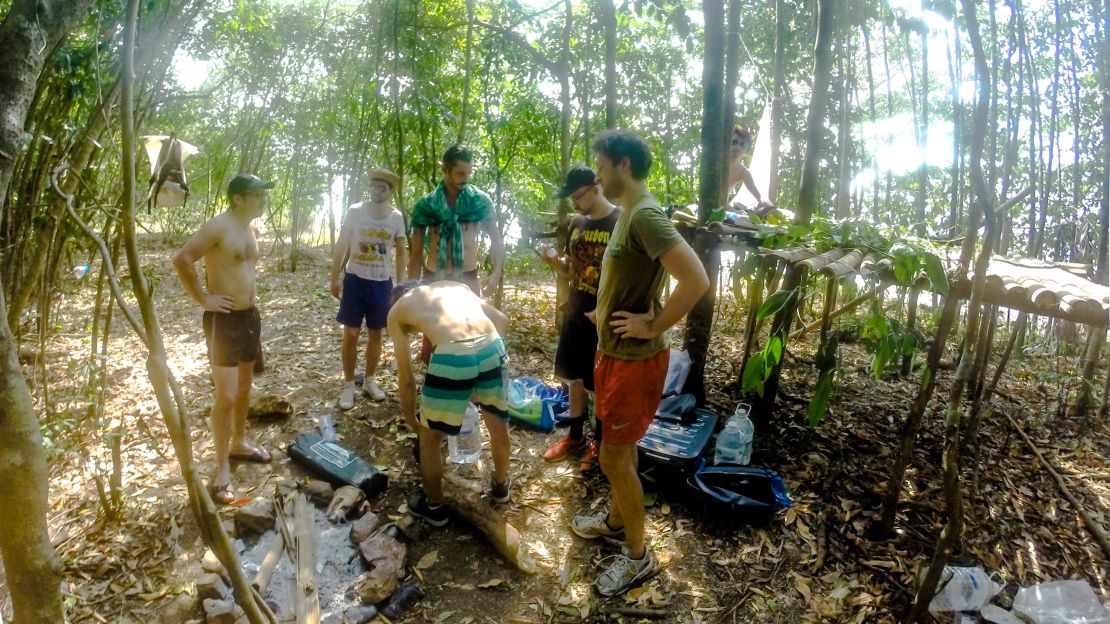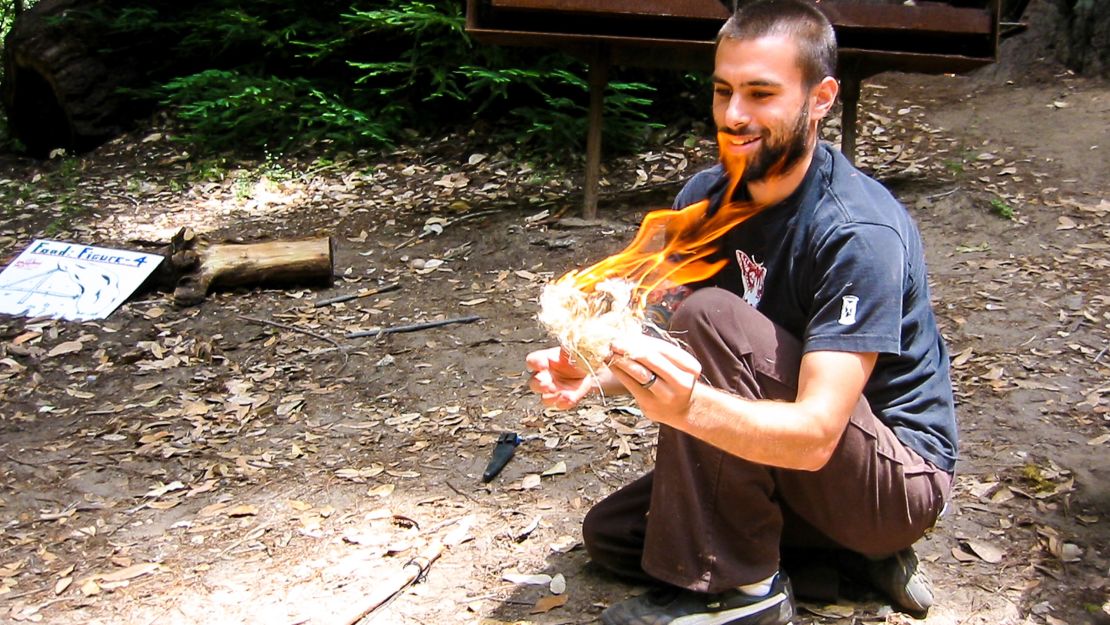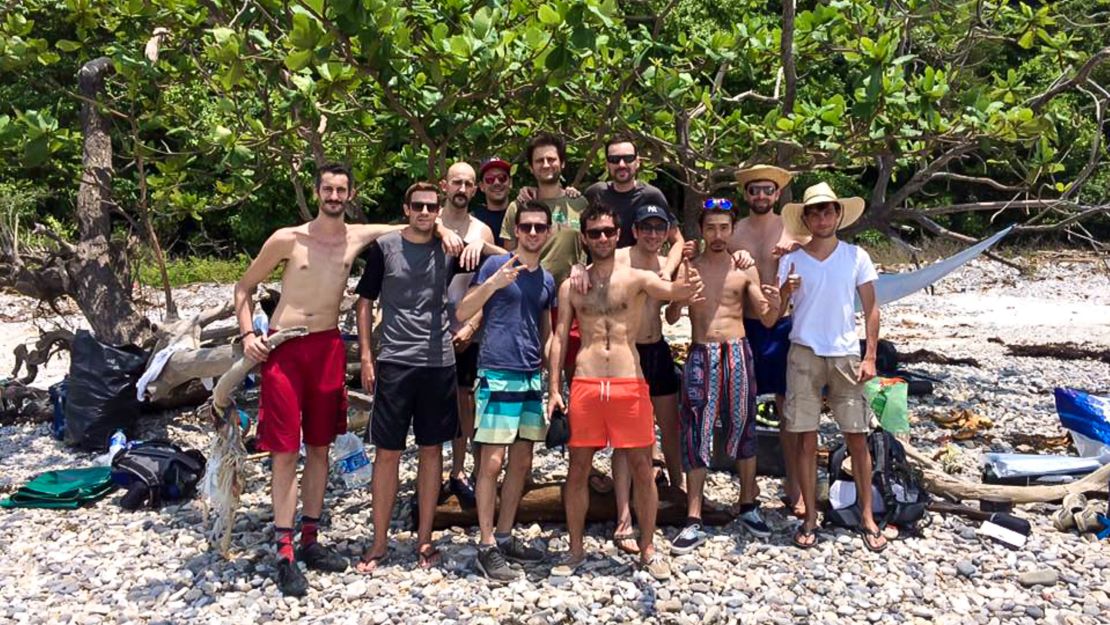On a hot April day on the coast of one of Thailand’s main islands, 15 young men hopped into two, long wooden boats piloted by local fishermen and made for the teal-green horizon.
Their destination: a deserted island, a half hour away by motorboat. An untamed jungle awaited there, nothing to eat but what nature provided, not a whisper of Wi-Fi, no source of illumination save the sun and the moon.
Each man could bring three items for survival, though they could not include sleeping bags, modern fire-making tools, phones,or food save a strict allotment of 200 grams of rice per person per day.
This is not a description of a new TV show concept, a sociological experiment or a modern-day reenactment of “The Lord of the Flies.” It’s a bachelor party that took place in 2016, organized by an adventurous group of French friends and the groom with whom they were celebrating.
“We didn’t want to go for the basic stuff you do at a bachelor party, getting wasted,” says Bérenger Nicot, one of the groom’s friends who attended the trip.
After devising the idea and some rules to make it a challenge, the group hired a wedding planner in Thailand to scout an uninhabited island they could rent for a few days. “We wanted to do something uncommon.”
Campfire bonding magic

In fact, bachelor parties with a survivalist bent are increasingly popular today – in this era of super storms, uncontrollable wildfires, and general civilizational unease, stag weekends that double as an education in self-reliance are even becoming a trend.
More and more grooms and their buddies are opting for outdoors-oriented outings in lieu of the Vegas-style vice fests typified by “The Hangover.” Among outfitters who organize weekend adventure trips into the countryside, survival programs are usually the most popular with bachelor parties.
“Traditional bachelor parties can put up walls,” says Ben-Jamin Toy, founder of On Purpose Adventures, a Charleston, South Carolina-based event planning company that organizes around 30 bachelor parties a year, including an “Island Survival Training” package. “Guys get real when it’s a different environment. Bonding over a campfire is magic. Big, gruff guys open up and just talk about life.”
Bachelor party participants are usually attracted to learning survival skills while celebrating their friend’s nuptials either because they’re hikers, trail runners, skiers, hunters or the like who could use the techniques in case of an emergency, or urbanites who crave a visceral immersion in the great outdoors because they spend their working days staring at screens.
“I think guys in particular opt for the wilderness because it takes them further from their regular 9-5 life,” says Kye Harman, marketing manager at StagWeb, a UK-based company that organizes action-packed bachelor parties around the world. “No computers, no phones, no work, just man and the elements.”
Survivalist bachelor parties often take their inspiration from TV shows like the kind hosted by Bear Grylls or even “The Walking Dead.” StagWeb offers a “Bear Grylls Survival Weekend” package which the British survival expert consulted on, in which attendees rock climb and learn to build shelters and rafts, while the groom is treated to a menu of edible bugs.
According to Cliff Hodges, founder of the California outdoor school Adventure Out, survival trips and workshops are by far the most popular with bachelor parties. Such trips can also come with a side of comeuppance for Robinson Crusoe wannabes: a frequent request made by the friends of the groom is to make sure he learns his place.
“Nearly every bachelor party we’ve done, the one getting married is always watching survival shows and […], being like, I could do that,” says Hodges. “His buddies are like, we want to learn stuff but we also want to show him that he doesn’t know everything. Put him in a real survival situation. Make sure this guy knows that he doesn’t know what’s up.”
Collective suffering

Hodges takes groups out in the lush Santa Cruz Mountains, teaching the priorities of survival: shelter, water, fire and food. Guys build and sleep in the shelters they construct, learn to forage for wild edibles, craft primitive snares and make fire by friction.
It tends to be an intense bonding experience, stressing the need to work together towards a common goal and “the concept of collective suffering,” says Hodges with a laugh. “Cohesion is worked into the activities. If they’re not working together, they’re not going to get it done.”
In rural Virginia, former US Air Force survival instructor Reggie Bennett and his wife Dina run the Mountain Shepherd Survival School, which has hosted around 10 bachelor parties.
The school tends to see a lot of visitors from the Washington, DC area – a telling indicator of the national mindset.
Dina has noticed that the deeper psychological appeal of survival courses for bachelor parties is often the same one that brings in people who have just had kids or are celebrating an anniversary. “There’s a sense of, now I’m not just responsible for myself, I’m responsible for others.”
Frank Grindrod, who teaches wilderness survival classes in western Massachusetts through his organization, Earthwork Programs, has found that learning survival skills out in the woods helps take the groom’s mind off the stresses of wedding planning.
As the men scout safe locations for shelter, identify medicinal plants, learn to use stone tools, and practice various methods of fire-making, they get in touch with themselves and the elements in a way that few experiences can replicate.
“It’s, ‘Wow, I haven’t thought about work in hours’,” says Grindrod. “They get quiet time, really understand how frenetic we are in life. They’re tuning in and getting into the rhythm of wilderness. It’s almost like a form of self-care. For men I’ve brought through this experience, it’s life-changing.”
For Nicot and his 14 friends on the deserted island, the trip proved unforgettable – and edifying.
The group was randomly split into two teams, red and blue, which ended up demonstrating the wide variance which different survival philosophies can make.
The first group walked a few meters up the beach, set down some mats on the ground, and made their camp there.
Nicot’s group happened to include a few close friends of his who had been prepping for the adventure by watching the “Primitive Technology” YouTube channel and practicing in the woods. They ventured out further, eventually finding a secluded spot not far from the beach.
Sneaky beer run

There, using hard bamboo driftwood, they proceeded to build a large platform “treehouse” about a meter and half off the ground, wide enough to sleep about a half-dozen guys. Another member who had rope wove a hammock with it.
With machetes they’d brought as items, they chopped down a coconut tree, using the fronds and branches to cover the platform, and drank the water inside the coconuts.
While one member built a huge bonfire from the sparks of a flint stone, others ventured out into the water to harvest sea urchins, which they served for dinner along with rice cooked in sea water and coconut water. “It was actually really good,” says Nicot.
The raised platform proved to be a boon come nighttime – members of the other team sleeping on the ground encountered snakes and moved onto the beach, where they were mercilessly exposed to mosquitoes.
But Nicot’s group experienced its real coup when they decided to go for a walk deep into the jungle. They discovered that in fact, it was not a deserted island after all – on the other side, a resort was being built, and the only part yet functioning was a bar.
They made a deal with the owner to come back later that night. Without telling the other group, they slipped away under the cover of darkness, made their way through the pitch black jungle, and arriving at the small bar, bought beers, watermelons, orange juice and cigarettes, and had themselves a feast.
“We filmed the whole thing,” says Nicot. “We made a video of us singing and drinking and smoking and eating watermelon while our friends were starving and lying on the ground doing nothing.”
They kept it a secret until the day of the wedding, showing the late-night excursion video to the groom during the reception to loud guffaws of laughter.
“It was a one-of-a-kind experience, something we’ll talk about for years,” says Nicot. In other words, exactly what you’d want a bachelor party to be.






